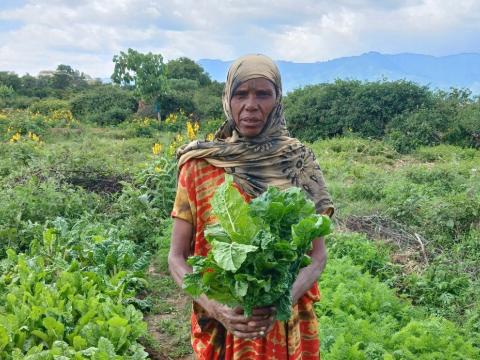Transformative Initiatives Empower Women Amidst Climate Change Challenges

In Ethiopia, changing climate and extreme weather pose a threat to the livelihoods of vulnerable households. Climate-related shocks particularly impact women due to income disparities, limited opportunities for women, and societal norms that diminish women’s resilience capacities. The theme for this year’s International Women’s Day, "Invest in Women: Accelerate Progress," emphasises the urgent need for gender-responsive climate initiatives and programming.
The world is facing many crises, ranging from geopolitical conflicts to soaring poverty levels and the escalating impacts of climate change. These challenges can only be addressed by solutions that empower women. By investing in women, we can spark change and speed the transition towards a healthier, safer, and more equal world for all.
Kedija's story is an example of the benefits of investing in women.

Kedija Tahir (35), a resident of Daro Lebu Woreda in the Oromia Region of Ethiopia. Kedija participated in training on Sustainable Land Management activities delivered by SPIR II that specifically focused on producing vegetables in backyard gardens. In collaboration with her husband and children, she implemented the SLM approaches, and achieved bountiful vegetable yields, enriching her family’s diet as well as providing financial gains.

Kedija's journey exemplifies how relatively simple interventions can have a transformative influence on women’s engagement in SLM and their contribution to their family’s well-being. The intervention was a success, reaching 1,240 households, among them 660 women and 580 couples, and leading to increased vegetable production, income diversification, joint engagement in production, and improved family health.
Kedija expresses her appreciation, saying, "Gratitude fills my heart as I extend thanks to the project for the life-changing training. I acknowledge the continuous support from them and the local Development Agency (DA) for their role in facilitating this life-changing knowledge."
Sustainable Land Management (SLM) practices, crucial for water retention and erosion control, offer promise in enhancing resilience. However, a lack of comprehensive evidence on their effectiveness at scale is evident. Baseline survey findings in rural Amhara and Oromia regions revealed that participation in SLM practices is male-centric, due to barriers such as women’s time constraints and limited access to information. Strengthen PSNP Institutions and Resilience (SPIR II) thus collaborated with the International Food Policy Research Institute on a controlled trial focused on empowering women and couples and enhancing women’s adoption of SLM technologies for climate resilience.
SPIR II's efforts to increase the practice of homestead gardens are driven by their potential to diversify food sources. The programme promotes organic farming practices through compost usage and targets Pregnant and Lactating Women (PLW) for home gardening initiatives. Since the programme's inception, 8,774 PLWs have engaged in home gardening, enriching their family's diet with nutritious produce.
(End)
About SPIR II
Strengthen Productive Safety Net Program (PSNP) Institutions and Resilience (SPIR) II is a five-year Resilience Food Security Activity (RFSA) implemented by a consortium of partners led by World Vision that includes CARE, ORDA, and learning partner IFPRI. It is powered by funding from the USAID Bureau for Humanitarian Assistance (BHA), which focuses on enhancing livelihoods and resilience to shocks and improving food security and nutrition for rural households in Ethiopia’s Amhara, Oromia, and Tigray regions through interventions aligned with the government’s Productive Safety Net Program (PSNP).
By Emnet Dereje, Communications Specialist, World Vision Ethiopia